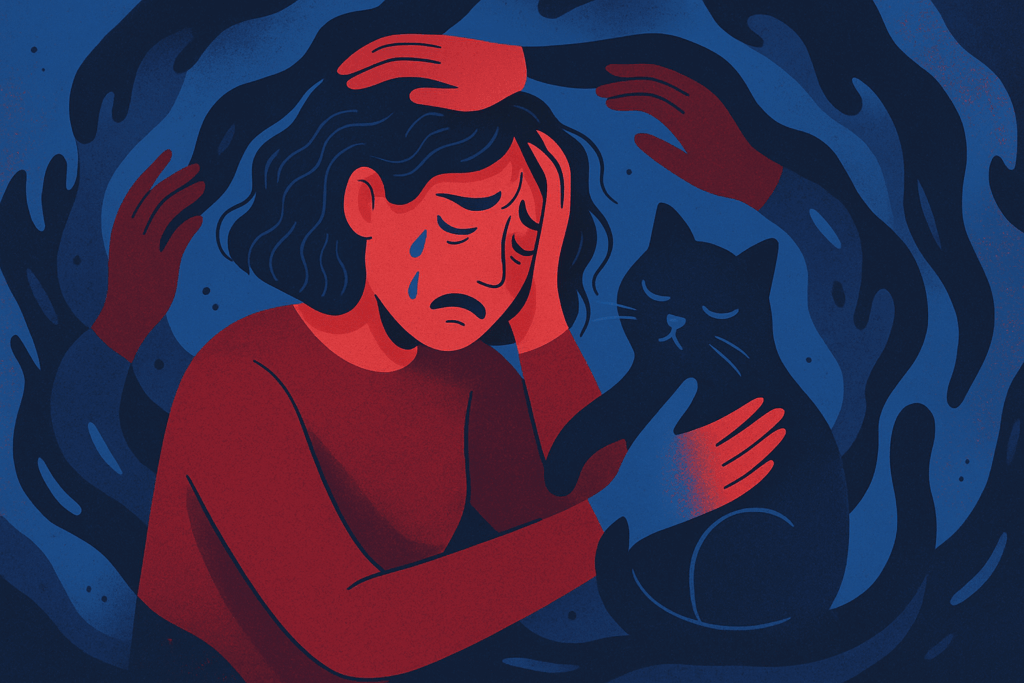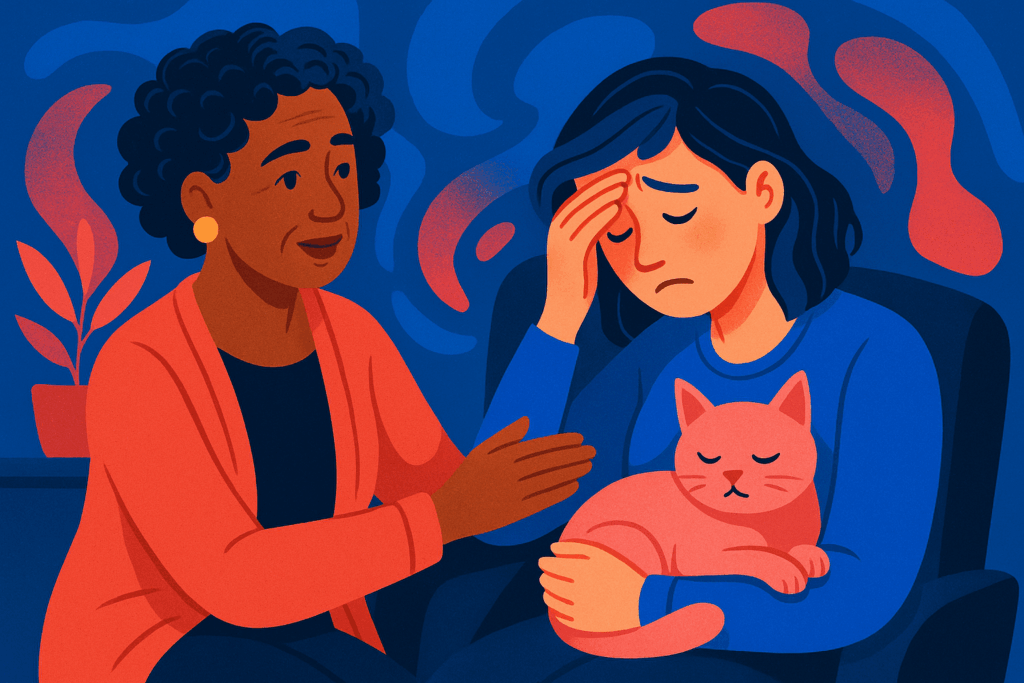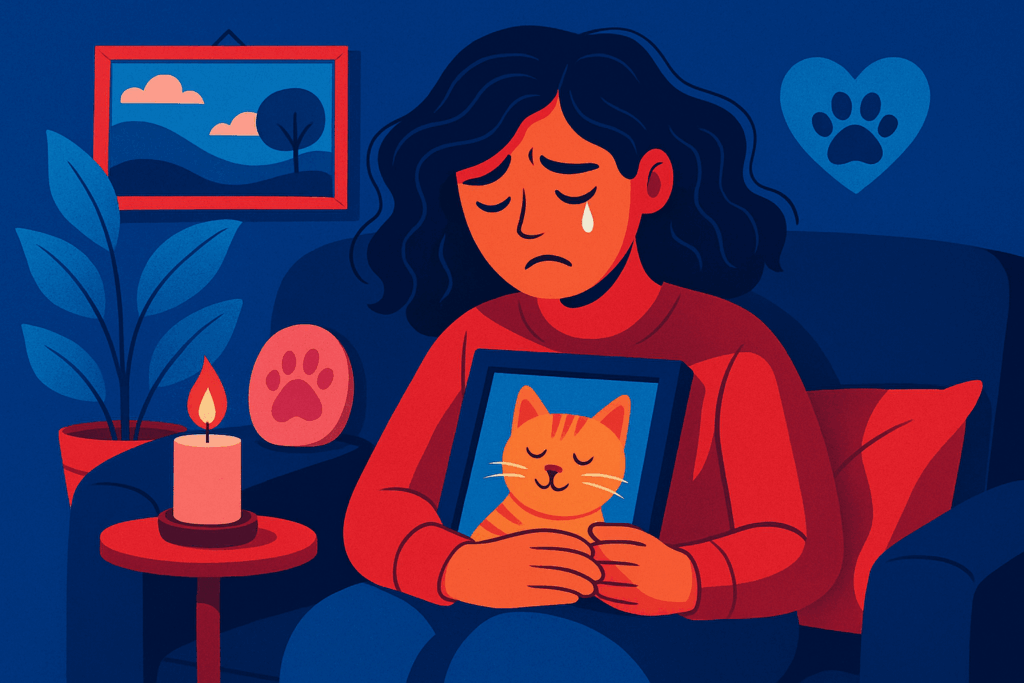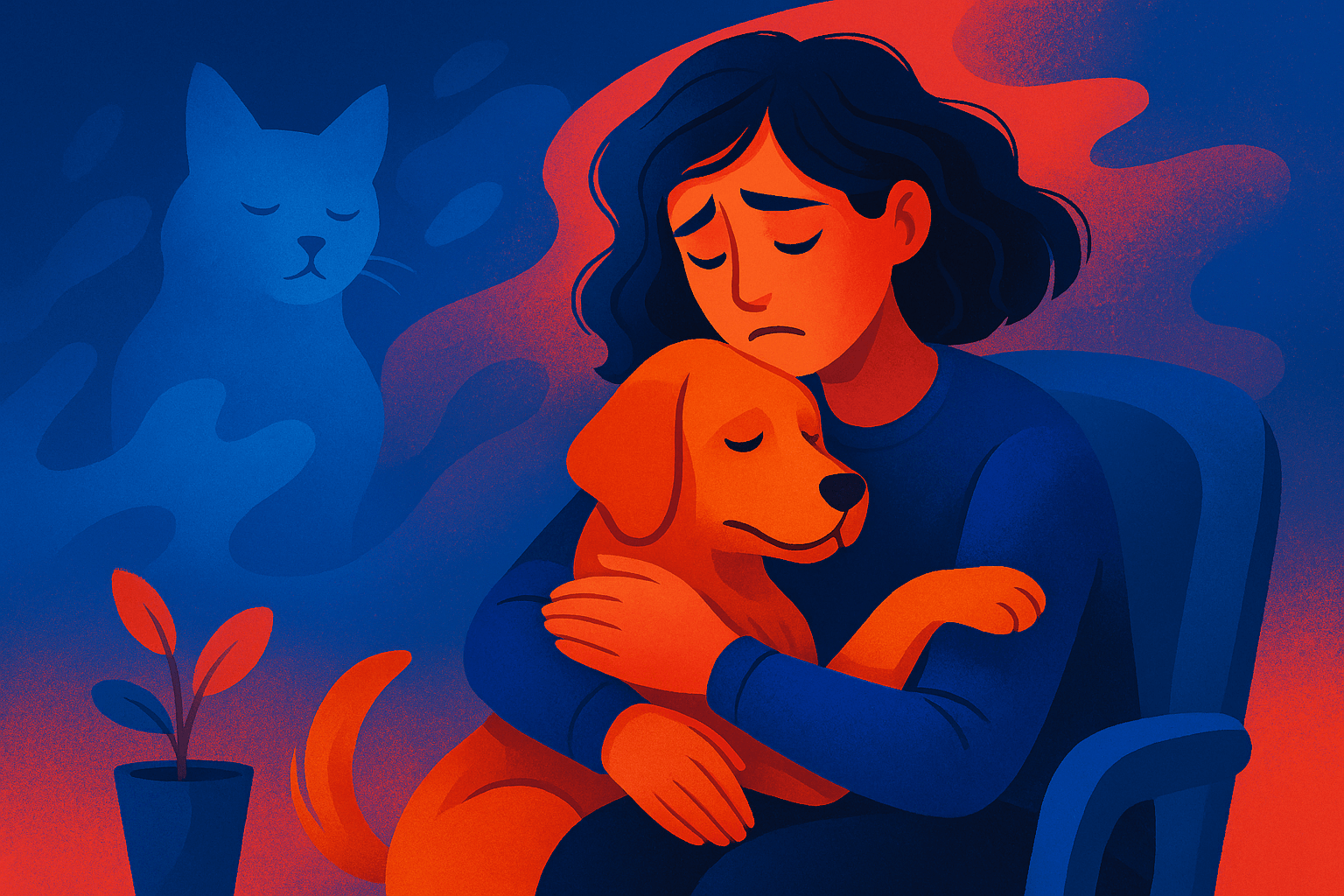More Than a Pet — Understanding the Human-Animal Bond
If you’ve ever looked into your pet’s eyes and felt truly seen, you’re not alone — and you’re not imagining things. For millions of people, pets are more than just animals. They’re companions, therapists, exercise buddies, and fuzzy emotional life rafts. The human-animal bond is incredibly powerful and emotionally complex, often rivaling (and in many cases exceeding) the relationships we form with other people.
So, why do we often feel closer to our pets than to other humans?
- Unconditional Love Without Drama: Pets offer unwavering love without critique. They don’t care if you bombed a presentation, go into analysis paralysis, or cry watching a cartoon. That kind of judgment-free companionship fosters deep trust and emotional safety.
- They Ground Us: While humans spiral into overthinking and existential dread, pets live fully in the now. This mindfulness-by-proximity can be therapeutic for anxiety, depression, and chronic stress.
- Low-Stress Companionship: There’s no pressure to impress your pet. No small talk. No emotional acrobatics. You just are — and that’s enough.
- They Get You: Many pets are incredibly attuned to our emotions. They sense when we’re sad or on edge, and they comfort us with a paw, purr, or nudge. It’s an intuitive response that can feel more sincere than words.
- They Show Up. Always: In a world of ghosting and flaky group chats, pets are a rare source of consistent loyalty. They’re there — no questions, no conditions.
This deep attachment is precisely why the grief that follows a pet’s death can be so devastating. Yet, this profound sorrow is often overlooked or brushed aside, even by well-meaning friends or family members.
When society downplays your pain — saying things like “You can get another one” or “It was just a cat” — it can leave you feeling isolated, confused, or ashamed. That’s where pet grief counseling becomes an essential support system. Therapy validates your experience, helps you navigate the mourning process, and gives you the tools to heal without guilt or judgment.
Grieving a pet doesn’t mean you’re weak or being “too emotional.” It means you loved deeply — and that love deserves appreciation, space, attention, and healing.
The Silent Grief — Why Pet Loss Is Often Minimized
Grief doesn’t play favorites. It doesn’t matter if your loved one had two legs or four, feathers or fur. It hits hard, deep, and often without warning. But when that grief is tied to the loss of a pet, it’s frequently brushed off by the wider world — leading to what psychologists call disenfranchised grief.

What is Disenfranchised Grief?
Disenfranchised grief is the kind of grief that society doesn’t quite know what to do with. It’s grief that isn’t publicly acknowledged, socially accepted, or easily supported. In the case of pet loss, it sounds like:
- “It was just a dog.”
- “You can always get another cat.”
- “At least you don’t have to clean up after it anymore.”
Even if these comments are meant to comfort, they can have the opposite effect. Instead of creating space for healing, they shut it down — leaving pet guardians to mourn in silence. This emotional isolation often compounds the pain, dragging out the grieving process and sometimes even leading to depression or anxiety.
Why Does Pet Grief Hit So Hard?
Let’s be real: Losing a pet can feel like losing a part of yourself. That’s not an exaggeration — it’s science. Studies show that the brain reacts to pet loss similarly to how it responds to the death of a human loved one. This includes:
- Intense sadness and weeping
- Disruption of sleep and appetite
- Difficulty concentrating or performing daily tasks
- Physical symptoms like fatigue or body aches
Why such a strong reaction? Pets are embedded in the rhythm of our lives:
- They’re there when we wake up and when we go to bed.
- They accompany us through seasons of life — breakups, moves, celebrations, lazy Sundays.
- They’re witnesses to our private moments in ways even our closest human friends may not be.
So when they’re gone, everything feels… off. The silence in the home is louder. The routines are suddenly meaningless. And worst of all, the world just keeps spinning, as if nothing happened.
Why Validation Matters
One of the most critical pieces of pet grief counseling is the validation of your loss. When a therapist trained in pet bereavement says, “Your grief makes sense,” it lifts the veil of shame and confusion. Suddenly, your pain is no longer something to hide — it’s something to understand and work through.
You are allowed to grieve. You are allowed to cry over a cat or a cockatiel or a Great Dane. You are allowed to miss them, honor them, and take your time finding your footing again. And if your environment isn’t giving you that space, therapy can.
What Pet Grief Feels Like — Emotions After Loss
Grief is not a one-size-fits-all experience. Some people fall apart. Others go numb. Some get angry at the world, while others feel crushed by guilt. No matter what form it takes, grieving the loss of a pet is a deeply personal journey, and it’s okay if your emotions are a tangled, unpredictable mess.
Below are some of the most common emotional responses to losing a pet. If you’ve felt any — or all — of these, know that you are not alone. You are not broken. You’re grieving.
1. Sadness That Feels Endless
The initial wave of sadness after losing a pet can be all-consuming. You may cry unexpectedly (and often), feel a heavy weight in your chest, or find that everything — songs, places, smells — reminds you of them. This sadness isn’t “just” about missing them; it’s about mourning the everyday rituals and unconditional love they provided.
2. Guilt
- “Did I do enough?”
- “Should I have seen the signs earlier?”
- “Was euthanasia the right choice?”
Guilt is one of the most common and painful emotions in pet loss. It often stems from a feeling of responsibility — because, as pet parents, we make decisions for beings who can’t speak for themselves. In pet grief counseling, a therapist can help you reframe these thoughts and show compassion toward the version of yourself that made the best choices you could at the time.
3. Anger or Frustration
You might feel angry at the vet, the illness, or even your pet for leaving you. These feelings might catch you off guard, but they’re valid. Anger is often a mask for deeper emotions like fear and helplessness.
4. Loneliness
Pets are constant companions. They follow you from room to room, sit at your feet during Zoom meetings, and greet you with joy at the door. When they’re gone, it’s not just their presence you miss — it’s the emotional rhythm of having someone always there. This loneliness can feel especially intense if you live alone or had a particularly close bond with your pet.
5. Loss of Routine and Identity
Many of us structure our days around our pets — feeding times, walks, cuddles, playtime. Their absence throws off that structure and can create a void where routine once was. You might feel adrift or unsure what to do with your time. If your pet was also an emotional support animal, the impact can be even more severe.
6. Physical Symptoms
Grief isn’t just emotional — it’s physical. You may feel exhausted, have trouble sleeping, experience appetite changes, or even get sick more often. These symptoms are your body’s response to emotional trauma.
Grief Isn’t a Straight Line
You may have heard of the “five stages of grief” — denial, anger, bargaining, depression, and acceptance. While this model can be helpful, real grief doesn’t unfold in neat, predictable steps. You might cycle through stages repeatedly or feel multiple emotions at once. That’s normal.
Pet grief counseling creates space for this unpredictability. It teaches you how to hold these emotions without being overwhelmed by them — and how to move forward without letting go of the love you still carry.
Because grief doesn’t mean forgetting. It means learning to live with love that has nowhere to go.
Emma and Max — A Story of Grief, Love, and Healing
Grief often feels isolating — like you’re the only one in the world mourning so deeply. But you’re not alone. Let’s walk through what happened with Emma and her dog Max, a powerful example of the love we carry for our pets and how pet grief counseling can offer a lifeline during the darkest days.
Emma and Max’s Story
Emma adopted Max, a golden retriever with soulful eyes and unshakable loyalty, when she was 28. Living alone for the first time in a new city, Emma had been feeling unmoored. Max grounded her. He celebrated her wins with joyful tail wags, sat quietly through heartbreaks, and never once judged her snack choices or bad TV binges.
Over the next 11 years, they built a life together. From muddy hikes to quiet mornings with coffee and paws under the table, Max became more than a pet — he was home.
Then came the cancer diagnosis. Emma was devastated but determined. She poured everything into Max’s treatment — time, money, sleepless nights. But despite her efforts, Max’s health declined. One day, with tears streaming and her heart in pieces, she made the decision to let him go peacefully at home.
And just like that, the apartment was too quiet. Emma found herself breaking down at random moments, avoiding Max’s favorite walking routes, and unable to focus at work. Well-meaning friends suggested that she “get another dog” or “try to move on,” but their words felt hollow. Emma wasn’t ready.
When Grief Became Too Heavy to Carry Alone
Eventually, Emma reached out to a therapist who specialized in pet grief counseling. That decision became the turning point in her healing.
- Validation: For the first time, Emma felt seen. Her grief wasn’t minimized. Her tears weren’t awkward. Her stories about Max were welcomed, not redirected.
- Guidance Through Guilt: She admitted the lingering questions — “Did I wait too long?” or “Should I have done more?” Her therapist gently helped her shift from self-blame to self-compassion. They reframed her decision to let Max go not as a failure, but as a courageous final act of love.
- Meaningful Rituals: With encouragement, Emma created a small memorial space: Max’s collar, favorite toy, and a framed photo. She wrote letters to him — pouring out her gratitude, love, and longing. These acts gave structure to her grief and honored their bond.
- Rediscovering Identity: Without Max, Emma felt lost — like part of her identity was missing. In therapy, she explored who she was before Max, who she had become because of him, and how to carry that forward. The work was slow, but transformative.
Opening Her Heart Again
Months later, Emma adopted another dog — not to replace Max, but to extend the love that still lived in her heart. Therapy helped her see that grief and love could coexist, and that healing didn’t mean forgetting.
Emma’s journey is deeply personal, but common. Pet grief counseling gave her the space, support, and skills she needed to not just survive her grief, but to grow around it.
Whether you’re still in the throes of fresh loss or sitting with a scar that occasionally aches, Emma’s story is a reminder: there is hope. Healing is possible. And love — real, fierce, four-legged love — never truly leaves us.
How Pet Grief Counseling Helps You Heal
Grieving the loss of a pet is like trying to walk through a fog — emotional, disorienting, and exhausting. But here’s the truth: you don’t have to walk through it alone. Pet grief counseling provides a compassionate space to process your loss and start rebuilding a life where joy and pain can coexist.

Let’s break down what pet grief counseling looks like, and how it can support you during one of the hardest transitions of your life.
1. Validation Without Judgment
One of the most healing aspects of grief therapy is simply being seen. Friends and family may minimize your pain, but a counselor trained in pet bereavement understands that your grief is real and worthy of attention.
In sessions, you’ll have the space to:
- Share stories and memories of your pet
- Express sadness, anger, guilt, or confusion without censorship
- Cry without needing to apologize
Therapists aren’t there to “fix” your grief. They’re there to witness it with empathy and provide a structure to support you through it.
2. Understanding the Grief Process
Grief is messy, nonlinear, and often unpredictable. One day you may feel like yourself again; the next, you’re triggered by the jingle of a dog collar or a whiff of your pet’s shampoo. That doesn’t mean you’re back to square one — it means you’re human.
In pet grief counseling, you’ll learn:
- What to expect emotionally and physically
- That there’s no timeline for healing
- How grief often comes in waves, not stages
- How anticipatory grief (if your pet had a lengthy illness) may add layers to your emotions
Understanding the why behind your feelings helps reduce anxiety and self-judgment. It also gives you permission to grieve in your own time and your own way.
3. Working Through Guilt and “What Ifs”
Guilt is a heavy backpack many grieving pet parents carry. You might ask:
- “Did I wait too long to say goodbye?”
- “Did I make the right decision with euthanasia?”
- “Should I have noticed something sooner?”
A therapist will help you explore these questions with compassion — not to erase them, but to bring clarity and kindness to your memories.
You’ll begin to:
- Reframe difficult decisions as acts of love
- Recognize how much you did do for your pet
- Release the need for perfection in impossible situations
4. Creating Rituals and Legacy
Rituals help us externalize grief and keep memories alive. Your therapist might guide you to:
- Make a photo book or scrapbook
- Write a goodbye or gratitude letter to your pet
- Plant a tree or flower in their honor
- Light a candle on anniversaries
- Share your story in a pet memorial group
These aren’t just sentimental acts — they’re therapeutic tools that can transform lingering pain into meaningful remembrance.
5. Reconnecting With Yourself and the World
After loss, life can feel empty and disorienting. Therapy helps you find your way back — not to the same life, but to one that integrates the loss and continues forward.
You’ll explore:
- Who you are now, after loss
- What brings you comfort, connection, and purpose
- How to open your heart again — whether to people, pets, or new experiences
This phase doesn’t mean forgetting your pet. It means learning to carry their memory as part of your story, not the end of it.
Coping Strategies for Pet Loss — What You Can Do Now
Whether or not you choose to pursue pet grief counseling, there are many supportive, tangible steps you can take right now to help yourself through this painful time. These aren’t magic fixes, but they are compassionate ways to create space for healing. Think of them as emotional first aid for your grieving heart.

1. Give Yourself Permission to Grieve
Yes, it’s that important, and yes, it comes first. Many people feel like they have to “be strong” or “move on quickly” — especially if others don’t understand the depth of their bond with a pet. But stuffing your grief down only delays the healing.
Let yourself:
- Cry, rage, write, sob in the shower
- Cancel plans if you’re not up for them
- Say “I’m not okay” without needing to justify it
⠀There is no timeline. There is only your timeline.
2. Talk About Your Pet
Share stories, memories, and even funny moments with people who get it. If friends or family seem uncomfortable, seek out:
- Online pet loss forums and grief groups
- Facebook communities or Reddit threads on pet bereavement
- Local grief support meetups
- A therapist who specializes in pet grief counseling
Talking helps validate your grief and keeps the memory of your pet alive in a positive way.
3. Create a Memorial or Ritual
Honoring your pet through a creative or symbolic act can help you process your grief. Here are some ideas:
- Frame your favorite photo of your pet
- Display their collar, tags, or paw print in a shadow box
- Write them a letter (or keep a journal addressed to them)
- Light a candle on their birthday or “gotcha day”
- Create a custom garden stone or memorial plaque
- Donate to a rescue in their name
- Write down your favorite memories of your pet in a special journal dedicated to your companion animal
These rituals allow your grief to take form, helping you externalize emotions and express love that still has nowhere to go.
4. Avoid the Comparison Trap
Grief is not a competitive sport. Some people adopt a new pet in a week. Others need years — or decide never to again. Some cry every day. Others feel numb. Some feel peace after euthanasia, others wrestle with guilt.
Your path is valid. Your grief is yours alone. Let it unfold in its own time and shape.
5. Watch for Signs You May Need Extra Support
While grief is normal, it shouldn’t leave you completely incapacitated forever. You might benefit from pet grief counseling if:
- You can’t sleep, eat, or function normally
- You isolate yourself for long periods
- You experience frequent panic attacks or depressive episodes
- You feel stuck in guilt or anger
- You think about self-harm or feel that life has lost meaning
Seeking help is not a sign of weakness — it’s an act of love for yourself and your pet. They wouldn’t want you to suffer alone.
6. Be Gentle With Yourself
Grief is a marathon, not a sprint. Some days you’ll feel a little better. Other days, something will bring the pain rushing back. That’s okay. It doesn’t mean you’re doing it wrong — it just means you loved deeply.
During this time, lean into comfort where you can find it:
- Warm baths
- Cozy blankets
- Nature walks
- Dancing
- Gentle movement
- Uplifting books or podcasts
- Art, music, or journaling
This is not about “fixing” grief. It’s about supporting yourself through it.
No matter where you are in your journey — numb, weepy, angry, or all the above — you deserve support, compassion, and healing. Whether that comes through friends, rituals, or professional pet grief counseling, just know: you don’t have to do this alone.
Your pet mattered. Your grief matters. And you matter.
When to Seek Pet Grief Counseling — Knowing the Signs
Grief is not always a red-alert emergency. Sometimes it’s quiet. Sometimes it’s subtle. It sneaks in through exhaustion, lost routines, or the way you still reach for a leash that’s no longer needed. But whether your grief screams or whispers, it can still take a toll.
So how do you know when your sadness is something you can navigate alone — and when it might be time to reach out for help? Let’s talk about the signs that pet grief counseling could make a real difference.

Signs It’s Time to Seek Counseling
If one or more of the following applies to you, it might be time to connect with a professional who specializes in pet loss:
- You can’t stop crying or the grief feels just as raw weeks or months later
- You feel stuck in guilt, anger, or depression, and nothing seems to shift it
- You’re having trouble functioning — like missing work, neglecting basic tasks, or withdrawing from others
- Your sleep and appetite are significantly disrupted
- You’re avoiding reminders of your pet (photos, their favorite spot, certain locations)
- You feel isolated or like no one understands your pain
- You’re experiencing panic attacks or intense anxiety related to the loss
- You’re questioning your ability to cope with life or having thoughts of self-harm
Needing help is not a sign of weakness. It’s a courageous and healthy response to emotional pain.
What to Expect in Pet Grief Counseling
If you’ve never been to therapy — or if you’re worried that a therapist might not “get it” — here’s what you can generally expect from sessions with a specialist in pet grief counseling:
- Safe emotional space to talk, cry, or even sit silently
- Tools to manage overwhelming emotions, including mindfulness, and grounding exercises
- Guidance on coping strategies for daily functioning and emotional resilience
- Support in processing medical decisions, euthanasia guilt, or trauma related to the loss
- Help creating rituals and memorials that honor your pet in healing ways
- Validation — the therapist understands your grief isn’t trivial and treats it with the respect it deserves
Sessions may be one-on-one, in groups, or virtual, depending on your comfort level and access.
Is It Ever “Too Late” for Counseling?
Absolutely not. Grief has no expiration date. You might start therapy days after a loss, or you might find yourself revisiting a pet’s passing from years ago because it was never fully processed.
You don’t need to “qualify” for help. If your heart hurts, and you want to talk about it — that’s enough. Therapy meets you where you are, whether that’s the fresh edge of heartbreak or the quiet ache of an old loss.
The Takeaway
Pet grief counseling isn’t about forgetting your pet or speeding through grief. It’s about healing with support. It’s about having a companion on your emotional journey — a steady hand when everything else feels like it’s falling apart.
If your pet gave you unconditional love, you deserve to give yourself the same.

